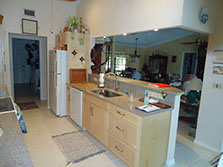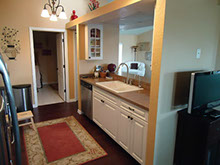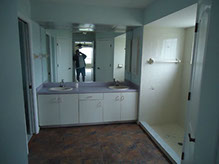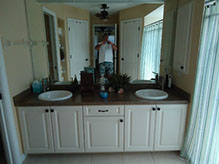Phone
(941) 769-0294

Roberto LoIacono Inc.
Specializing in Remodels, Additions, Home Repairs, and New Construction
Residential and Commercial Construction Services
How to live with your remodeling project
Remodeling Projects
Before & After Shots
Kitchen Before

Kitchen After

Bathroom Before

Bathroom After

With remodeling, your home becomes the work site. You live side-by-side with the project from start to finish. The following tips will help make living with your project as pleasant as possible.
Communication
Successful remodeling projects depend upon mutual trust and consistent communication between you and ERS. You need to count on ERS’s technical expertise and ability to complete the job as promised. In addition, we will count on you to carefully prepare for and understand the remodeling process. Consistent and open communication between you and us will enhance your understanding of the project, provide an opportunity to exchange ideas, and ultimately help to make the experience a positive one for everyone involved. The suggestions listed below can help you ensure that the necessary communication occurs:
Determine whom ERS should contact for daily decisions or an after-hours emergency. Exchange phone numbers in advance, especially if you are traveling.
Designate a backup for each contact person to assure continuity in anyone's absence.
Create a place in your house where the contact persons can leave messages for each other.
Speak up. If you are uncertain about any aspect of the job, bring your concerns to our attention. ERS wants the project to be a satisfying experience and will work with you to achieve that goal.
Timing & Schedules
The time necessary to complete remodeling projects varies based on the scope of the work and factors as uncontrollable as the weather. A bathroom-remodeling project may take just a few weeks, while a two-story addition may take 6 months or more. To help keep your project on schedule, plan ahead:
If your job requires a permit, work can begin only when that permit gives ERS legal permission to proceed. Depending on where you live, obtaining permits can be time-consuming, so remember to build that time into your schedule.
ERS may give you a rough idea of start and completion dates for each phase of the project.
For most large projects, expect to set aside time for telephone calls and regular meetings with the company's contact person to review progress and discuss the schedule for the coming weeks.
Even if weekly meetings are unnecessary, ask ERS to provide a schedule to help you prepare for the coming week.
ERS may have to order products that are unavailable locally. Ask which product decisions require the longest lead-time. Make all selections as soon as possible, especially custom-made items.
Realize that changes you make to the project after work has begun may affect the schedule and the budget. Change orders will include prices, full descriptions, and authorization in writing by both parties before work begins. All change orders require 100% payment upon signing the order unless ERS needs to issue a credit.
One way to ensure the success of your project is to plan for and actively participate in a pre-construction meeting.
ERS will use this opportunity to clarify procedures, assign responsibility, and show how the job will progress. This discussion gives both you and ERS the information needed to prepare for issues that may arise later. Think of the meeting as a forum for all participants to define their expectations and agree on the anticipated outcomes. Be prepared to take notes. The pre-construction meeting probably will cover some of the topics described below.
Jobsite Signage
Will you allow ERS to place a company sign on your property? (In addition to being helpful as marketing tools, signs help trade contractors and suppliers locate your jobsite.)
Jobsite Access
We will need to agree upon a pathway for workers, construction equipment, and vehicles in order to avoid damaging outside structures, plants, and flowerbeds.
Work and Storage Areas
What areas in your home are off limits to workers? Will ERS need access to areas such as the attic, or garage? Do you have a place to store building materials for your project?
Furniture and Other Personal Belongings
What areas in your home are off limits to workers? Will ERS need access to areas such as the attic, or garage? Do you have a place to store building materials for your project?
Security
What areas in your home are off limits to workers? Will ERS need access to areas such as the attic, or garage? Do you have a place to store building materials for your project?
Safety
What areas in your home are off limits to workers? Will ERS need access to areas such as the attic, or garage? Do you have a place to store building materials for your project?
Salvaging Materials
Does the space to be remodeled contain any special items (such as lighting fixtures or cabinets) that you would like to save from demolition? If so, where do you want to store them? Unless otherwise designated in the contract, a common policy is for the company to dispose of salvaged items as it sees fit.
Debris
Where will ERS locate the dumpster on the property? Can you use it for trash unrelated to your project?
Utility Interruptions
Does ERS anticipate any interruptions of utilities during the project? If so, when and for how long? At certain stages of construction, your project may affect basic house-hold necessities (such as hot water, a flushable toilet, and electricity). Will you need to vacate the house at any time?
Clean Up
Will sweeping be sufficient for daily cleaning or will you need a more thorough cleaning in order to use the space? How thorough do you want the final clean up to be? Who will arrange and pay for such a cleaning?
Start and Stop Times
What times will workers begin and end work at your home? Be sure to consider the neighbors as well as household members. ERS may contact your neighbors and give them a phone number to call if they have a concern about your project.
Questions
During the work day, while workers are active on your project questions regarding changes or concerns will naturally arise. To avoid any mis-communications please refrain from discussions with the field staff. Many steps “ behind the scenes” are necessary to maintain contractual agreements and forward movement on your project. It is the best interest of the project, no matter how small the question may be, to contact our office for all answers. ERS appreciates your cooperation with this procedure.
Parking
Where can workers park near your job site?
Phone
Our workers have phones. There should be no need to use yours.
Bathroom
Will any bathroom facilities in your home be available for the crew?
Smoking
ERS will provide a container for ashes and cigarette butts.
Language
ERS has a policy that forbids profanity on the jobsite. If you are especially sensitive to this issue, say so at the preconstruction meeting.
Radios
Will you allow workers to play their radios at a reasonable volume?
When? (Some crews start their workdays early.
Prepare For Inconvenience
Remember that your home will soon become a worksite. ERS and the crew will work hard to respect your privacy and help to minimize any inconvenience. Nonetheless, the train-station atmosphere may lead to remodeling fever. You may feel a loss of control because of disrupted routines and the impact on your personal space. The best approach is to (a) prepare well, (b) remember the temporary nature of the disruption, and (c) focus on the progress being made.
The pace of the work varies throughout the project. Demolition and framing may seem to occur swiftly while finish work will often seem endless because you will not see significant change during this phase. The paragraphs that follow offer ideas for preventing and alleviating remodeling fever.
A remodeling project can turn your home and (on some days) your life upside down. For instance, you will sacrifice convenience during a kitchen-remodeling project. However, a little ingenuity and some culinary shortcuts can lessen the impact. Set up temporary cooking quarters by moving the refrigerator, toaster oven, and microwave to another room. Arrange a clean-up station in your laundry room. In warm weather, ready the grill and dine alfresco.
Designate a Safe Haven
Set aside a room in your home where you can escape from the chaos and commotion.
Guard Against Dust
During a remodeling project dust has the unfortunate tendency to appear everywhere on lampshades, on clothes, and even between plates stacked inside your kitchen cabinets. Reduce the impact of dust and dirt in the following ways:
Seal off doorways and stairs.
Turn off central heat or air when workers are sanding.
Stock extra filters so you can change them often.
Have deliveries made through a designated entrance. Use doormats and temporary floor coverings where appropriate.
Remove anything that might get damaged by the dust or at the least cover it with plastic drop cloths and tape the plastic shut.
Maintain a Sense of Humor
You may need it when the weather refuses to cooperate or a vendor postpones the delivery date for materials.
Enjoy the Remodeling Process
Tell children you are "camping-in" and turn inconvenience into fun. Along the way, celebrate at completion of phases of the project; for example, splurge on your favorite take-out food when the space is plastered or dry-walled.
Pride, Dedication, Service, Quality
ERS takes pride in our work, our office Staff and Field Staff strives to make this an enjoyable event for you.
We want to thank you for choosing us.